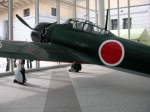30 December 2006
Short Novel: The Flight to Tokyo, Chapter 1
A story of a B-29 pilot who time-travels from the war-time Tokyo to present-time.
At midnight of March 10, 1945, James Austin was flying over the enemy's capital, Tokyo.
He was in US Air Force's bomber aircraft, B29. The mission was to bomb the city to give the enemy shock and owe. This is important mission to end the war.
Austin was 21 year old pilot, from Conneticut. Over there his parents, Tom, Jane and 10 year-old sister who had been suffering from asthma live. His parents told him his sister would die before he would come back home. That was what the docter told them. So he had to survive in the war. He would be the only child in his family.
Grisping control gear, he was thinkng of his sister, whom he called Katie. She had had problems with her health since she was born. He and his parents had known that she wouldn't live long.
He gave her a present before he joined the army. It was a doll. Very pretty doll like Katie. Katie named the doll "Clara."
He remembered Katie said "Jim, please come back alive. I will live too." Then he promised he would live and when he comes back he would give her another doll as the sisiter for Clara. Katie said she would be excited to meet Clara's sister. Katie told Jim Clara needs something common with her sister. That means Jim had to buy a doll that fits the condition for Clara's sister, which Katie requested. But there is no hope for Katie to meet Clara's sister.
No hope to live. The same words should be delivered to the people beneath him. He and his colleagues in the army called them "Japs." His plane was going to drop firebombs onto their residents. Wooden houses that are easily burned down. Women and children are part of the target. But for the army, they are enemy Japs who do not deserve their lives.
Jime never thought it was cruel thing to do. Jim read the newspaper articles which describes how brutaly Japanese army slaughtered Chinese civilians including women and children by bombing from the air and on the ground. Bombing of Chongqing, and Rape of Nanking. Japanese army have done such terrible things. Japan attacked Pearl Harbour. It was a sneak attack. They killed thousands of American soldiers.
Now none of the people below him should be considered non-combat personels.
"Open the hatch. It is show-time." The captain said. The plane was in the formation of air-raid with hundreds of planes dropping the bombs. As co-pilot of the plane, Jim pulled the lever to open the hatch. But he found something is strange. The plane is not dropping the bombs.
The hatch is not open. He pushed back the lever and tried pulling it again. But it didn't work.
"What is wrong?" said the captain.
"The hatch is not open. It cannot work, sir." Jim replied.
"Ok. maybe we should lower the altitude, then that should work when the hatch is a little more strained."
"But sir, we shouldn't get away from the formation. And it is dangerous. It would be easier for the enemy to hit us by their ground fires." Jime felt fear.
"Are you saying we should go back home with heavy bombs loaded while others fly back with empty stomach?"
"But..."
"We are soldiers, we should accomplish this honorable mission. We cannot get away from it."
"All right, Captain." said Jim. He agreed with Captain's words. Totally. The whole crews should risk their lives for the cause. To end the war and bring the victory for the United States of America.
The plane with 11 crews including co-pilot, Jim, Captain and other members lowered the altitude. Of course they turned off from the formation so that the plane wouldn't be hit by the bombs coming from the above.
They confirmed they were in the right position. What they saw above through the ceiling window was only dark sky. What they saw beneath through the floor window was burning city. A lot of houses and building seemed to be on fire. Jim wondered if they should drop any more bombs onto the ground when the city had got already enough damage.
Jim pulled the gear. He heard the big sound. The sound of hatch opening and bombs dropping.
The whole crew were relieved to hear the sound. They have accomplished the mission.
Then it was the time to go back to where they came from.
But suddenly they heard another big sound, Bang. Then they felt the plane was shaking and smelled the fire. Right after that, they felt the heat. They found their plane was burning.
Jim realized the sound was made by ground fire hit on the plane.
The plane lost the balance. Soon the fire surrounded Jim and Captain.
"Oh, my god." said the Captain. "We got hit."
Jim saw the captain burning beside himself. Then he realized fire was covering on him.
He pressed the bottom as he learned at Air Force Academy. It was what a pilot should do to evacuate the plane. Then he did.
He escaped from the plane. Soon he found himself floating in the air by the parachute.
He was going down slowly. He saw the plane that he was in falling down burning. Of course it was dropping very quickly because it had no parachute with it.
He had no idea of what to do next. Where he would land was the enemy line. The enemy's capitol. After he would land on the ground, he would be caught or shot by the enemy, Japs.
He saw what was beneath his feet. Fires. Very hot he felt. It was getting hotter and hotter.
He thought he would be dead before the enemy would find him.
The worse thing happened. The leashes of the parachute were suddenly cut off.
He fell down with no parachute. But strangely he did not fall not as quickly as the gravity pulls.
He felt something was trying to absorb him. He did not know what it was.
He felt he was going to land with no harm.
Then he landed. He was alive with no injuries. He bent his knees putting his hands on the ground, actually it was wooden floor. He found himself in a house. He then found himself surrounded by the fire. He felt very very hot.
"Oh, no, I am in the burning house. The house of Japs." He shouted in his mind.
He stood up and trying to find a way to get out of the house.
Fire and smoke were the only thngs he could see.
"Tasukete, tasukete." A voice of woman was heard to his ears. He couldn't understand what she was saying but he easily assumed it was a cry for help.
He looked around. He saw a woman lying just a few steps from him. Then he also saw the doorway to get out of the house. He wanted to run away as soon as possible. There is no time to take care of a woman, especially the enemy's woman.
But he realized he had to because he was a gentleman. He held up a woman with his arms. He then ran to the doorway.
He suddenly got out of the house and the fire. The outside was much cooler. He felt winter air.
He got on the road. He then found himself surrounded by the people looking at him very seriously.
"Oh my god, Japs are looking at me." He said to himself in his mind.
He thought that he was going to die. Then he fainted. A woman on his arms was dropped. Jim lied down beside her on the road.
To be continued to Chapter 2.
The story is updated monthly, basically. Sometimes delayed.
This novel is copyright of author of this blog, Masagata.
23:50 Posted in My novel, US-Japan relationship | Permalink | Comments (0) | Tags: war, tokyo, military, time travel, history, literature
11 December 2005
Met with the survivors of Nanking Masscre
Yesterday I went to the meeting to hear the testimonies of Nanking Masscre survivors. Two people showed up and talked about their experience in ther villages near the former Chinese capitol, Nanking, December 1937. They are very old people. One of them is 85 year-old man, and the other is 77 year-old woman. They were child at the time the masscre occured.
Japanese army came into their villages. The stories they told the audience (mostly Japanese) were horrible. Their parents were killed in front of them. 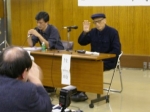
The old man's villagers were gathered on the ground and shot by machine-guns. 23 of them were all together killed and later stabbed by the swords. The old man was saved but sexually abused by the soldiers.
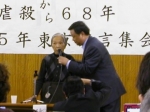 The old lady's mother was shot to death in front of her and she was also shot in her hand. Her life had changed greatly since then. She had to be married to someone for her life at the age of 12 or 13.
The old lady's mother was shot to death in front of her and she was also shot in her hand. Her life had changed greatly since then. She had to be married to someone for her life at the age of 12 or 13.
After the meeting I walked past the Parliament Building. The meeting was held near the parliament. It was very peaceful place. See the picture in the Photo Gallery. The contrast between the stories of the survivors and the landscape of the capitol was so big.
The reality was they are co-related. That place made a decision to dispatch troops to China at that time and caused them such painful memories. Yet the goverment has not compensated the victims. Some of the politicians expressed apologies but always after that, some of the cabinet members said something to turn down. Current prime minister visited war crimials' shrine. Their stance is so inconsistent.
Some so called right wingers are trying to rewrite the history. They believe nothing bad was done by Japanese army. They think or want to think the atrocities were made up by Chinese.
This nation is on the crisis. Now is such an important time to strengthen relationship with neighboring Asian nations but top politicians who have to place importance on national interests are deteriorating that. Unless Japan reviews and compensates the past atrocities, we will have no future.
18:00 Posted in China | Permalink | Comments (0) | Tags: war, political issues, history
04 November 2005
Japanese media's role in supporting atrocities of WW2
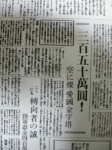
60 years have passed after Japan’s surrender in World War II, the citizens of Japan are able to speak about how much pain and suffering that they experienced as a result of the war, yet we are unable to discuss how much pain and suffering that Japan caused the citizens of other nations. To discuss such things one runs the risk of being labeled masochistic. Those in mass media willing to report upon the country’s responsibility for the atrocities that occurred during the war are also few and far between. Why do they not wish to cover such stories? One might reason that this is because the media reflects public opinion, but this is not the entire explanation. Rather it is also because the media itself bears a portion of blame.
The photo shows an article in the August 5, 1937 edition of the Asashi Newspaper.The headline reads, “3.5 Million Yen! A Glorious Monument to Patriotism”. The article contains a report on the collection of 3.5 million yen in donations and introduces some of the donors following the Asahi Newspaper’s collection of donations for the production of military aircraft. Even a mother and her child in elementary school are featured among the donors. However, the reality is that the military aircraft produced from these donations was flown to China and used to bomb such cities as Chongqing resulting in the slaughter of innocent civilians. Many people would probably be surprised to hear that the Asahi Newspaper collected donations for production of military aircraft. Considering that the newspaper is known for being a large liberal media outlet which often covers Japan’s accountability for war crimes such as the issue with so-called “comfort women” and the Nan king Massacre. The Asahi Newspaper may now even seem pacifist with its recent critical position towards the Japanese Self Defense Forces participation in Iraq, but this was not the case just prior to World War II. In fact, it may be more accurate to say that this was not the case for the period between the Manchurian Incident and the end of the war. Prior to the Manchurian Incident, which thrust Japan into the messy quagmire of the 15 year war to follow, the Asahi Newspaper objected to the dispatch of troops to Siberia during the Taisho Period (1911-1926) and further took the position of moderates who were in favor of a peaceful resolution without the use of military force to protect Japan’s interests in Manchuria.
Why then did this position change? It is generally understood that this change was due to the boycotts that occurred after the outbreak of the Manchurian incident in 1931. As a public weary of the economic recession leaned towards military fervor, Asahi found that it’s stance contrary to other media and not in sync with military views resulted in a drop in its sales. After this, the Asahi Newspaper editorial policy changed drastically.
Prior to the war, it is generally said that newspapers, magazines, and other media could not criticize the military because they were subject to intense scrutiny by authorities and laws limited their freedom of speech. However, this was not the only reason. Mass media of this era not only failed to criticize, it became a backer in a sense fanning the flames of war. It chose to support the war in an effort to increase circulation and sales. In other words, it did so in tune with the public opinion of the time which was in favor of war. This same phenomenon is at work today. Great example is US media's reports on wars in Afghanistan and Iraq.
The Frankfurt School, established by Jewish Scholars who defected from Nazi Germany, is critical of mass media which takes this position. It says that the press and mass media should above all take a neutral and impartial position and should not curry favor with emotional public opinion. It is thought that the spread of Nazism in Nazi Germany was due to the bolster support provided by mass media. At that time it appeared that the papers’ sales grew and stimulated national opinion, but in fact mass media lost sight of the all important truth and dragged society in an utterly inane direction Germany, a defeated nation like Japan, chose to abolish all of the newspapers which bolstered the Nazi regime. Yet in Japan, the mass media of the prewar period survived. Moreover, it has yet to apologize to the public for the role that it played in World War II, and to this day the press club system symbolic of the cozy relationship between mass media and government officials still thrives. In fact, this may be why none of the Japanese newspapers are willing to own up to the past. It is for this reason that we, along with mass media, are unable to fully own up to our accountability and the circumstances of Japan’s defeat in the war.
On this, the sixtieth year after the end of the war, shouldn’t the media take this chance to recognize its past role in the tragedies of World War II to and apologize to the Japanese public? Moreover, shouldn’t it use this as an opportunity to apologize to the citizens of all of the countries in Asia which suffered as a result of invasions by Japan? In addition, it is imperative that we, as the passive readers and the consumers of mass media, use this opportunity to reflect on history and reexamine ourselves. We are now in the age of the internet in which media is not just limited to newspaper, television, and radio. It is time to broaden our intellect to fight back against the prevailing mass media that contorts the truth to cater to the masses. Furthermore, it is essential that we endeavor to promote the advancement of media that no matter the circumstances always meets the truth head on.
21:10 Posted in Media | Permalink | Comments (1) | Tags: political issues, history, Japan
20 October 2005
Fucking Prime Minister Visits War Criminals' Shrine
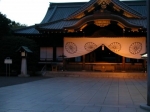
Prime Minister Koizumi is idiot.
He is just making our country worse. He visited the controversial shrine which honours war criminals responsible for Japan's invasion of China. The shrine insists the war was just and liberated Asians from western imperialism. That is not true. The Japanese army killed many, many Asian civilians there.
Asian victims and their familes never forget that.
Half of Japanese citizens including me oppose his visit to the shrine. business people, too.
Prime Minister says it was private visit. Private? He went there with press. Since he is a PM, he can never be a private person.
For Americans, it should be great news, as Japan's relationship with China got worse, US government can get more dealing cards when it comes to negotiate with Japan or China. For China and Japan, it is just a bad card.
The top picture is the sanctury of the shrine.
The shrine has the museum that shows how bravely Japanese army fought in the war. The war Japan failed.
The below is picture of famous zero-sen air-fighter.
